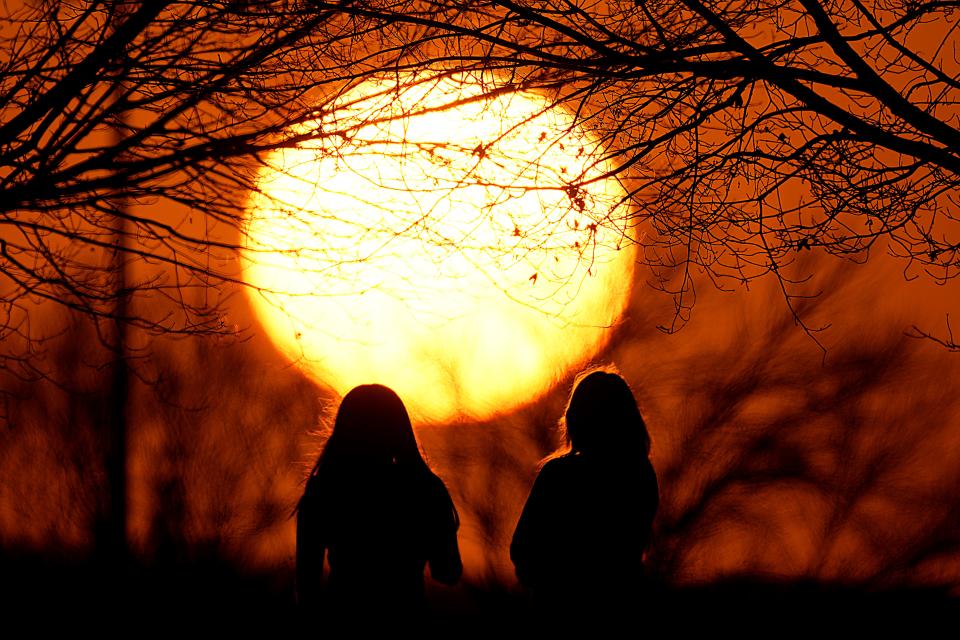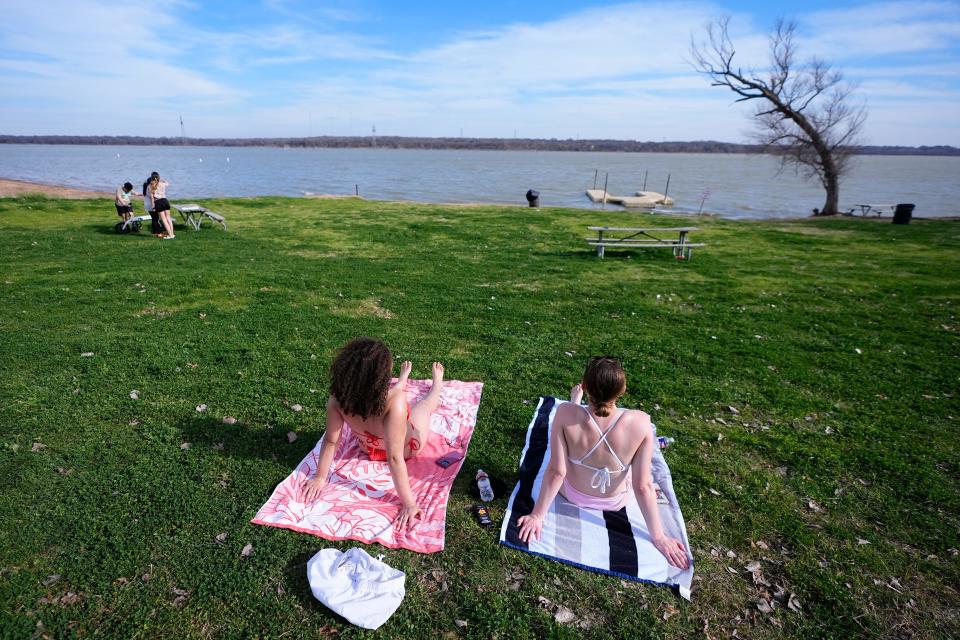Snow, heat, fires and tornadoes: Weather across US brings extremes
Fluctuating temperatures have been recorded across much of the United States as the Northwest faced a blast of cold, while record-shattering warmth fueled rapidly growing wildfires in the Texas Panhandle on Tuesday.
The unseasonably warm temperatures along with strong winds and dry conditions have resulted in at least four wildfires that threatened communities in the Texas Panhandle on late Tuesday, according to the Texas A&M Forest Service Incident Viewer. The Smokehouse Creek Fire, the largest blaze, closed highways and remained 0% contained as of Tuesday afternoon.
Meanwhile, the National Weather Service warned Tuesday that a major winter storm will primarily impact the Northwest on Wednesday and Thursday before hitting the mountains in California later in the week. Multiple feet of snow were forecast for higher elevations, including the Cascade and Sierra passes.
The Storm Prediction Center said "scattered strong to severe thunderstorms, associated with large hail, damaging gusts, and a few tornadoes will be possible from late Tuesday afternoon into the evening and overnight" in the upper Midwest. By Tuesday evening, preliminary reports showed four possible tornadoes in Illinois.
Tornado in Chicago
Tornado warnings were issued across parts of Indiana, Michigan, and Illinois, including Chicago. Preliminary reports showed four possible tornadoes in Illinois on Tuesday evening, including one just west of Chicago in Schaumberg, according to the Storm Prediction Center. Flooding also had closed lanes on Interstate 55 near Lawndale in Cook County, Illinois, and the weather service had reported wind gusts of more than 70 mph.
More than 50 million people faced a threat of severe weather threat Tuesday night, stretching north and east from Arkansas into New England.
In Wichita, Kansas, the weather service reported the office plunged from a daily record high temperature of 80 degrees at 2 p.m. to snow within hours and residents are expected to wake up to single-digit wind chills on Wednesday morning.
Wind-driven fires in central, south U.S.
The warmer temperatures also brought an increased risk of fires across the Great Plains. The National Weather Service said dry, gusty winds were creating critical fire weather conditions and issued red flag warnings and fire weather watches in parts of New Mexico, Colorado, Texas and Oklahoma, up to Kansas, Nebraska, South Dakota and east to Iowa, Illinois and Missouri.
Wildfires in Texas' rural Panhandle prompted evacuation orders in small towns and shut down a nuclear facility. Texas Gov. Greg Abbott issued a disaster declaration for 60 counties as the Smokehouse Creek Fire burned more than 250,000 acres, according to the Texas A&M Forest Service.
Multiple fires were also reported across Hemphill and Hutchinson counties near the Oklahoma border, where some evacuations were ordered. And in central Nebraska, a mower sparked a prairie fire that has burned more than 70,000 acres of land, state officials said Tuesday.
Record warmth from Plains to Midwest
How warm? On Monday, dozens of record highs were set across the central U.S., as temperatures rocketed to the 80s as far north as Nebraska, according to Weather.com meteorologist Jonathan Erdman. By Tuesday, he said, all-time February records will be in jeopardy in Chicago; Green Bay, Wisconsin; and St. Louis, among other locations.
AccuWeather meteorologist Alex DaSilva called the temperatures "springlike" and said the warmth will be in store for much of the center of the country from the southern Plains to the Midwest. "Some cities will have high temperatures rising as much as 15-30 degrees above typical late-February values" on Tuesday.
Said Mark Gehring, a weather service meteorologist in Sullivan, Wisconsin: “We’re blowing away the records in northern Illinois into south central and southwestern Wisconsin.”
A golden glow: Watch as Yosemite's Horsetail Fall glows golden during annual 'firefall' event: Video

Winter almost a no-show for much of the country
The warmth will be another reminder that "winter" has been practically a no-show for a large chunk of the central and northeastern U.S. over the past few months. Several states, including Michigan, Minnesota and Wisconsin, were on track for their warmest winter on record, Erdman said, and other Midwest and Northeast states were targeting their top-five warmest winters.
Climate scientists define winter as the three months of December, January and February.
Blizzard-like conditions, dangerous travel expected in the West
In the West, the storm will create near-blizzard conditions, resulting in dangerous travel, the National Weather Service said. Snowfall rates of 1-2 inches per hour will move into the Great Basin and Central Rockies on Tuesday.
"These snow rates combined with winds gusting 50-65 mph will produce near-blizzard conditions with significantly reduced visibility and snow-covered roads, leading to dangerous travel," the weather service said.

Contributing: The Associated Press
This article originally appeared on USA TODAY: US weather forecast includes snow, heat, fires and tornadoes

